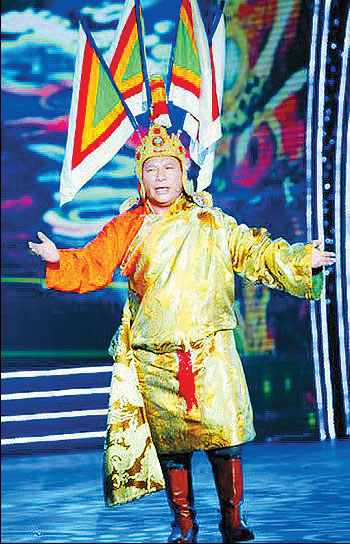 |
| Dawa Zhagba, a “God-taught” singer, recites the epic. (Shanghai Daily) |
The story of King Gesar is reputedly the world’s longest epic of around million lines, and balladeers claim they are divinely inspired to chant the thousand-year-old saga. Wu Guangyu and Zhou Yan report.
Dawa Zhagba can chant for hours on end without faltering or stopping for a drink, and lines from what is reputed to be the world’s longest epic, “King Gesar,” seem to pour out on their own.
The 36-year-old balladeer dresses in gold-colored armor and wears a crown as he chants for crowds of avid listeners in a pasture in the Yushu Tibetan Autonomous Prefecture in northwest China’s Qinghai Province.
“King Gesar” is a thousand-year-old ballad about a semi-divine 11th-century Tibetan king who conquered the demons, hostile tribes and helped ordinary people. It has a million lines, more than 120 episodes and is chanted throughout Central Asia, notably in Tibetan areas. Chinese experts are compiling texts and recordings.
Like all of the epic’s singers, Dawa claims he learned the lines in a mysterious way. “I was herding cattle in pasture at the foot of a mountain when I was 13. I leaned against a rock to rest but fell asleep,” he says.
“In my dream, an old man told me that I had a special mission and would be endowed with supernatural power,” he recalls. “I was to choose between the ability to communicate with all animals and the power to tell King Gesar’s story.”
Without hesitation, young Dawa chose to tell the story. After he woke up, he fell ill with a high fever for three days. When he recovered, he found he could “magically” recite the epic, telling King Gesar’s story and mimicking the voices of different characters without having to think.
“I knew immediately I had acquired the supernatural power the old man spoke of in my dream, and I had become one of the ‘God-taught singers’,” he says.
Since then, Dawa has traveled across China’s Tibetan-inhabited areas, chanting the epic for his devoted audience. He sings for free, except when he’s invited by individuals or businesses to perform on special occasions.
Wangzhag, a Gesar researcher based in Yushu, says the Tibetans believed all the “God-taught” ballad singers’ fortunes lay in their ability to pass on King Gesar’s legend.
“Nearly all the bards wandered about and lived in poverty throughout their lives,” says Wangzhag.
In recent years, however, the impact of modernization has motivated some epic singers to change their calling.
Sonam Norbu, one of the best-known singers in Yushu’s Zhidoi County during the 1990s, gave up his inspired mission to become a businessman.
“It’s a pity that when he died, he didn’t leave behind any recordings or texts of the epic he once sang so well,” says Wangzhag.
The epic of King Gesar is considered the crowning masterpiece of Tibetan folk literature.
Only around 130 Gesar singers are alive, including Tibetans, Mongolians and members of the Tu ethnic group. Most are illiterate herders or peasants from the Tibet Autonomous Region, Qinghai Province and the Inner Mongolia Autonomous Region.
All the singers claim they were suddenly able to sing the ballad after a strange dream or a serious ailment.
Dawa says he was blessed to become a King Gesar singer and will devote his life to singing the epic.
“I’m lucky to be singing at a time of economic boom — a time when an airplane can take me to where my ancestors could never get, even if they had walked all their lives,” he says.
New technologies have spread King Gesar’s legend to a larger audience, with MP3 and CD versions of the epic available in distant cities.
Dawa has sung more than 100 episodes and his singing has been recorded into 28 audio releases. Meanwhile, he has helped compile seven volumes of King Gesar texts, four of which have been published.
“I hope my son will become a King Gesar researcher if he’s not a ‘God-taught’ singer like me,” he says.
The boy, age 11, is very interested in the epic and enjoys his father’s singing.
Dawa is one of 12 “God-taught” epic singers in Yushu prefecture. They receive a 1,000-yuan (US$163) monthly stipend from the local government.
“It’s essential to preserve the cultural heritage in its original form. Otherwise, it will one day exist only in text in museums,” says Wangzhag.
China, in its three-decade-long campaign to preserve the million-line epic, has recorded 5,000 hours of singing and compiled 36 volumes. The epic has also given rise to a whole field of study referred to as “Gesarology.”
The epic has been adapted into symphonies, musicals and dramas.
“We can expect King Gesar to be a familiar icon on the international stage in the near future,” says Yi Na, a cultural researcher with the Chinese Academy of Social Sciences.
 Storms leave 97 dead, 58 missing in Mexico
Storms leave 97 dead, 58 missing in Mexico New model of indigenous surface-to-air missiles testfired
New model of indigenous surface-to-air missiles testfired  118.28-carat diamond to be auctioned in HK
118.28-carat diamond to be auctioned in HK Maternal love under streetlight
Maternal love under streetlight Naked foreign student sits in the middle of a road in Haikou
Naked foreign student sits in the middle of a road in Haikou  Colorful Yunnan: Enjoy the natural beauty
Colorful Yunnan: Enjoy the natural beauty Harbin named Chinese city with most beautiful women
Harbin named Chinese city with most beautiful women New college students' military training in Guangzhou
New college students' military training in Guangzhou Rugby girls
Rugby girls PLA's 38th Group Army conduct training
PLA's 38th Group Army conduct training Residences of the royal house of Savoy
Residences of the royal house of Savoy The last days of Wan Aihua
The last days of Wan Aihua Highlights at 12th National Games of China
Highlights at 12th National Games of China Beijing Film Academy welcomes freshmen
Beijing Film Academy welcomes freshmen Large mahjong party sets new world record
Large mahjong party sets new world recordDay|Week|Month